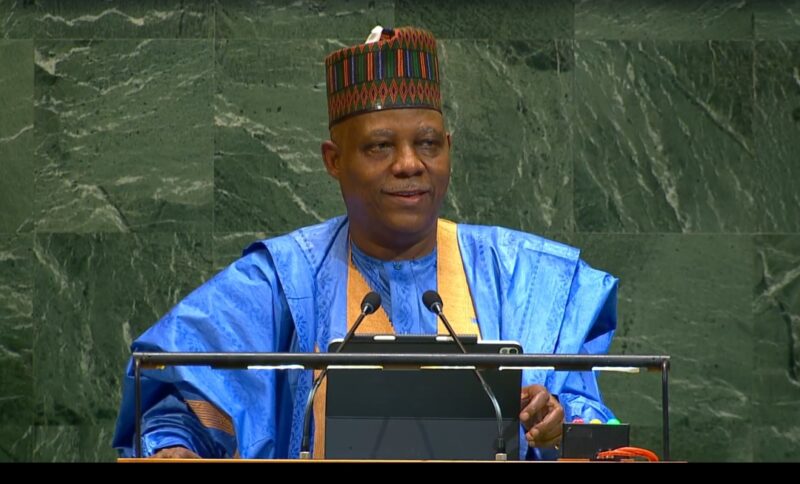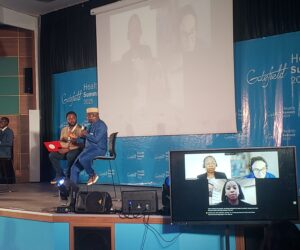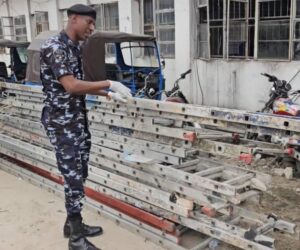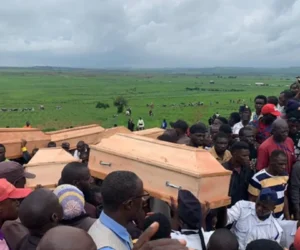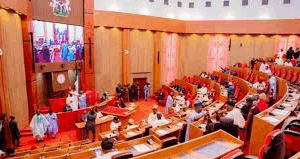•Insists Nigeria must have permanent seat at Security Council
From Juliana Taiwo-Obalonye, Abuja
At the 80th session of the United Nations General Assembly yesterday, President Bola Tinubu called for urgent and sweeping reforms of the global body to ensure its continued relevance.
Represented by Vice President Kashim Shettima, President Tinubu warned that without urgent restructuring, the UN risks becoming sidelined as global events increasingly take place beyond its influence.
President Tinubu outlined four core reform demands, first among them Nigeria’s call for permanent membership of the UN Security Council. He argued that the council must reflect today’s world, not the post-World War II order.
“Nigeria must have a permanent seat at the UN Security Council. This should take place as part of a wider process of institutional reform. The United Nations will recover its relevance only when it reflects the world as it is, not as it was.”
He noted Nigeria’s growth from “a colony of 20 million people, absent from the tables where decisions about our fate were taken,” to “a sovereign nation of over 236 million, projected to be the third most populous country in the world, with one of the youngest and most dynamic populations on earth.”
The President expressed frustration with the slow progress on issues such as nuclear disarmament, Security Council reform, and fair access to trade and finance.
“When we speak of nuclear disarmament, the proliferation of small weapons, Security Council reform, fair access to trade and finance, and the conflicts and human suffering across the world, we must recognise the truth. These are stains on our collective humanity.”
Highlighting ongoing human suffering in conflict zones like the Middle East, President Tinubu criticised the UN’s “careful diplomatic language” that masks inaction.
He said these failures are “stains on our collective humanity” and urged the international community to bridge the gap between words and deeds.
“For all our careful diplomatic language, the slow pace of progress on these hardy perennials of the UN General Assembly debate has led some to look away from the multilateral model,” he said.
“Some years ago, I noticed a shift at this gathering: key events were beginning to take place outside this hall, and the most sought-after voices were no longer heads of state.”
Taking a firm stance on the Palestinian conflict, President Tinubu called for a two-state solution as the most dignified path to lasting peace.
“The people of Palestine are not collateral damage in a civilisation searching for order. They are human beings, equal in worth, entitled to the same freedoms and dignities that the rest of us take for granted,” he asserted.
On global financial governance, he proposed establishing an international judicial mechanism to oversee sovereign debt crises, helping developing nations escape harmful economic dependencies.
“I am calling for a new and binding mechanism to manage sovereign debt, a sort of International Court of Justice for money, that will allow emerging economies to escape the economic straitjacket of primary production of unprocessed exports,” he said, adding that debt relief should be pursued as a route to peace and prosperity rather than charity.
President Tinubu also positioned Africa’s mineral wealth as critical to global stability, urging investment in local processing and fair partnerships to reduce international tensions.
“Africa – and I must include Nigeria – has in abundance the critical minerals that will drive the technologies of the future,” he said.
“Investment in exploration, development and processing of these minerals, in Africa, will diversify supply to the international market, reduce tensions between major economies and help shape the architecture for peace and prosperity.”
Addressing the digital divide, he echoed the UN Secretary-General’s vision that “A.I. must stand for ‘Africa Included’,” calling for expanded access and dialogue to close wealth and knowledge gaps.
On Nigeria’s domestic front, the President acknowledged ongoing economic hardship but highlighted reforms as a pathway to resilience and growth.
“The government has taken difficult but necessary steps to restructure our economy and remove distortions, including subsidies and currency controls that benefited the few at the expense of the many,” he said.
“I believe in the power of the market to transform. Our task is to enable and facilitate, and to trust in the ingenuity and enterprise of the people. But the process of transition is difficult.”
On Nigeria’s fight against terrorism, President Tinubu emphasised ideological victories over military tactics: “Military tactics may win battles measured in months and years, but in wars that span generations, it is values and ideas that deliver the ultimate victory.”
He closed with a call for renewed commitment to multilateralism and human rights, stating, “Nigeria’s commitment to peace, to development, to unity, to multilateralism, and to the defence of human rights is beyond compromise. For none of us is safe until all of us are safe.
“We must make real change, change that works, and change that is seen to work. If we fail, the direction of travel is already predictable.”

